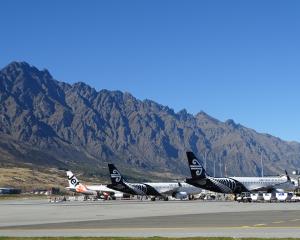
Auckland-headquartered Ministry, recognised for its expertise across residential, commercial, hospitality and aged-care projects, dates back to the 1890s — today it provides masterplanning, urban design, architectural and interior design services.
It’s just employed hugely experienced designer Nick Plimmer — who’s called Wānaka home for the past four years — as its relationships manager, aiming to strengthen the company’s reach across the lower South.
Having studied interior design in Christchurch, Plimmer worked in London around 2001 and then spent 16 years in Dubai as a senior interior designer, primarily working on projects with "semi-government developer" Emaar, including the design and fit-out elements of the Fashion Avenue Dubai Mall extension.
In between times, in the mid-2000s, he worked for Tony Koia and was involved in designing Queenstown’s Pounamu Apartments, developed by Kelly McEwan, of Urban Collective.
However, he’s always been engaged in an element of business development, which has progressed to him doing that full-time.
That’s the main focus in his new role — having spent the past four years in the Queenstown Lakes, Plimmer believes his local insight, paired with his international design experience in Europe and the Middle East, gives him a "unique perspective on how we can deliver projects that are both ambitious and sensitive to place".
That’s one of Ministry’s "special particular qualities", he says.
"We’re very good at partnering with clients and assisting them to identify sites for development and providing a strategy and lots of testing as well, in terms of is this site going to work for development, or what you have intended for it?"
Plimmer says there’s a variety of factors which go into answering that question, starting with if it’ll make business sense.
On the government’s ‘Going for Housing Growth’ ambitions, he says a need for more housing’s been identified and more needs to be implemented, "but it has to make sense from a business perspective for developers".
"And there are a variety of factors influencing those decisions at present."
They include the cost of building, which goes through the development sector at large, and lending rates.
"If you’re going to go into high-density, multi-storey buildings, then you have to make sure that the person looking to purchase the property can actually afford those bank loans, those mortgages."
The manner in which any proposed development will impact its surrounding environment is another major consideration, while the cost of infrastructure servicing’s "critical".
"So, essentially, if you’re a developer, you’re having to really weigh up and tally up what are the factors going to be when looking to undertake a development that can start to assist with the housing issues that we have around New Zealand?"
In Queenstown, however, Ministry’s primary focus will be on the "growing hospitality sector", the luxury retirement sector and the healthcare sector, Plimmer says.
"It’s just an initial study and taking it progressively into those three sectors ... then beyond that, we are also looking into various other sectors that are growing within the Queenstown and Otago area."
That may include build-to-rent developments, education and data centres, responding to the evolving demand here.
With his design hat on, Plimmer says he’s "very encouraged" by several new developments in the Whakatipu, and Wānaka, believing over the next decade the district will evolve "in a very positive manner".
He points to ROKI Collection, fronting Lake Esplanade and overlooking Lake Whakatipu — which officially opened its doors on Monday — developed by a company associated with Australian Denis Mackenzie, as one example.
"To see this gentleman take the plunge, take a section of the Queenstown waterfront and do something very special and dramatic with it is really encouraging.
"Queenstown’s always looked to me as if it’s, understandably, maybe 500 years behind like examples, such as Switzerland and Austria ... but it’s got all the same qualities, just waiting to happen.
"And then you have [Mackenzie], who’s determined to do something and make a statement."
Other recent developments he’s impressed by include Ayrburn, developed by Chris Meehan’s Winton, and Fernhill’s Noctis by Kamana, being developed by Coherent Hotel Ltd.
"That’s really going to be some of the highest standard of international hospitality.
"Part of why it’s super-encouraging seeing the likes of these ... businessmen, these investors, these groups down here is because they have a distinct interest in supporting local architects and designers.
"And that’s a big part of our reason for having me ... evolving an office down here, because they have a genuine interest in supporting the region, and businesses that commit themselves to the region.
"While these businessmen can have the interest in supporting smaller architects and design firms, it’s really the likes of Ministry that has all the backing and support and resource to make these projects of scale happen in the right way," Plimmer says.











